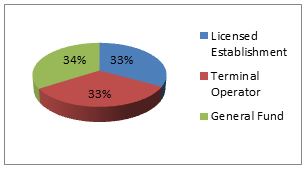Licensed establishments are restaurants, bars, taverns, hotels or clubs that have valid liquor licenses or malt or brewed beverage licenses under Article IV of the Pennsylvania Liquor Code.
Pennsylvania House Bill 808, introduced this week, would authorize video gaming machines for video poker, bingo, keno and other games in establishments with valid liquor licenses, such as restaurants, bars, taverns, hotels or clubs, in Pennsylvania. Similar legislation was introduced last year. In addition to providing an overview of the legislation, this Alert highlights the many similarities and distinct differences between House Bill 808 and last year's legislation.
What's Authorized
Licensed establishments with less than 2,500 square feet would be permitted up to five video gaming terminals. One additional terminal would be permitted for every additional 500 square feet, up to a maximum of 10 terminals. In comparison, last year's legislation authorized up to only three machines at an establishment.
Maximum wagers are held to $2.50 with a maximum payout of $500 and a payout percentage of 85 percent. The only change from last year's legislation is a reduction from $1,000 to $500 on the maximum payout.
Distribution of Profits
 Net profits from the video gaming terminals will be distributed as follows: 34 percent to the General Fund of the Commonwealth; 33 percent to the licensed establishment; and 33 percent to the terminal operator.
Net profits from the video gaming terminals will be distributed as follows: 34 percent to the General Fund of the Commonwealth; 33 percent to the licensed establishment; and 33 percent to the terminal operator.
Under last year's legislation, 45 percent of video gaming profits would have gone to school property tax rebates, 23 percent to licensed establishments, 22 percent to vendors, 5 percent to host municipalities and 5 percent to licensed casinos in the Commonwealth.
Under the new legislation, host municipalities would receive $1,000 per machine. Under the prior proposal, municipalities would have received only $500 per machine (but also would have participated in net revenue).
Eligibility Considerations
Licensed establishments are restaurants, bars, taverns, hotels or clubs that have valid liquor licenses or malt or brewed beverage licenses under Article IV of the Pennsylvania Liquor Code. Licensed establishments are not required to be separately investigated and shall be issued a license by the Pennsylvania Gaming Control Board (PGCB) upon a showing of good standing with the Liquor Control Board.
Terminal operators (referred to as "machine vendors" under the previous legislation) are individuals or entities licensed by the PGCB that own, service and maintain video gaming terminals for placement in licensed establishments. Terminal operators must pay an annual fee of $25,000 for 50 or fewer terminals and an additional $500 for each additional terminal.
Distributors are individuals or entities licensed by the PGCB to buy, sell, lease, service or distribute video gaming terminals. Distributors are subject to an annual $10,000 fee.
Manufacturers are individuals or entities licensed by the PGCB that manufacture, produce or assemble video gaming terminals or major parts and components of video gaming terminals. Manufacturers are subject to an annual $10,000 fee.
Background Investigations for Manufacturers, Distributors and Terminal Operators
The Pennsylvania State Police will conduct background investigations as to the personal and business character, honesty and integrity of terminal operators, manufacturers and distributors.
Such investigations will include an examination of: criminal and civil records; personal, financial or business records, including tax returns, bank accounts, business accounts, mortgages and contracts; and personal and business relationships.
Manufacturers and distributors will be subject to a $10,000 license fee, while terminal operators will be subject to a $5,000 application fee.
Terminal operator, manufacturer and distributor applicants are required, if applicable, to provide letters of references from every gaming agency where the applicant has previously conducted gaming operations. If the applicant cannot produce such a letter of recommendation, the applicant has to certify it is in good standing and produce a copy of the recommendation request.
Similar to last year, any applicant with a felony conviction within 10 years of the application date is barred from obtaining a license.
Residency Requirements
The newly proposed legislation requires certain persons affiliated with video gaming to be residents of the Commonwealth:
| Form of Entity | Terminal Operator | Manufacturer | Distributor |
| Sole proprietor | 2-year resident | None | None |
| Partnership | 2-year residency requirement for each partner; at all times subsequent to licensure, majority ownership must be held by Pennsylvania residents | None | At all times subsequent to licensure, majority ownership must be held by Pennsylvania residents |
| Associations, LLCs and Corporations | 2-year residency requirement for each 10-percent owner | None | None |
Under the previous legislation, distributors were subject to a one-year residency requirement for sole proprietors and partnerships, while corporate distributors were required to demonstrate operation of a coin machine distributorship office and sales staff in Pennsylvania for at least one year prior to the application.
Additional Notes
Licensed establishments and terminal operators need to have written agreements with a minimum term of 60 months. Agreements have to be approved by the PGCB.
Licensed establishments are prohibited from advertising gaming.
We note this bill comes on the heels of last month's public hearing of the Pennsylvania House Committee on Gaming Oversight on video gaming. We provided a description of that hearing in a recent post on our Duane Morris Gaming Law Blog.
For Further Information
If you have any questions about this Alert, please contact Frank A. DiGiacomo, Christopher L. Soriano, Eric D. Frank, Adam Berger, any of the attorneys in our Gaming Practice Group or the attorney in the firm with whom you are regularly in contact.
Disclaimer: This Alert has been prepared and published for informational purposes only and is not offered, nor should be construed, as legal advice. For more information, please see the firm's full disclaimer.







